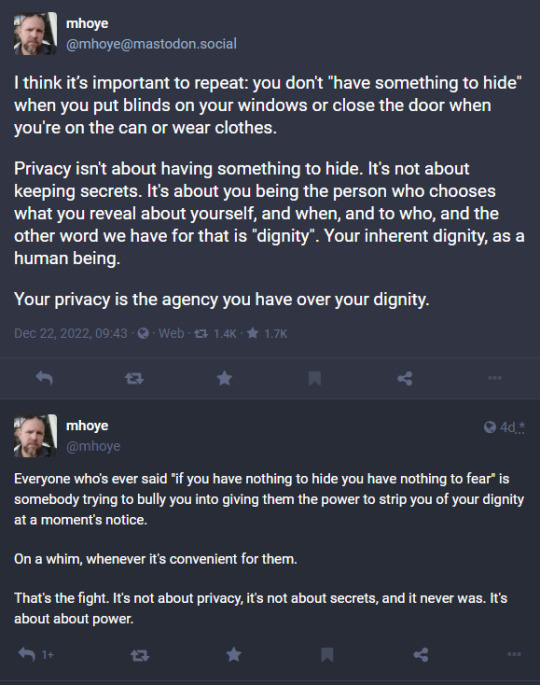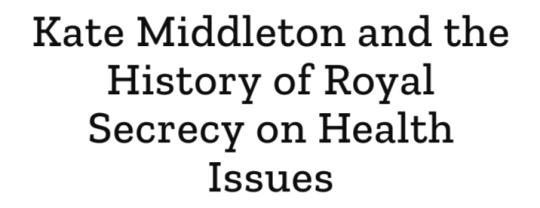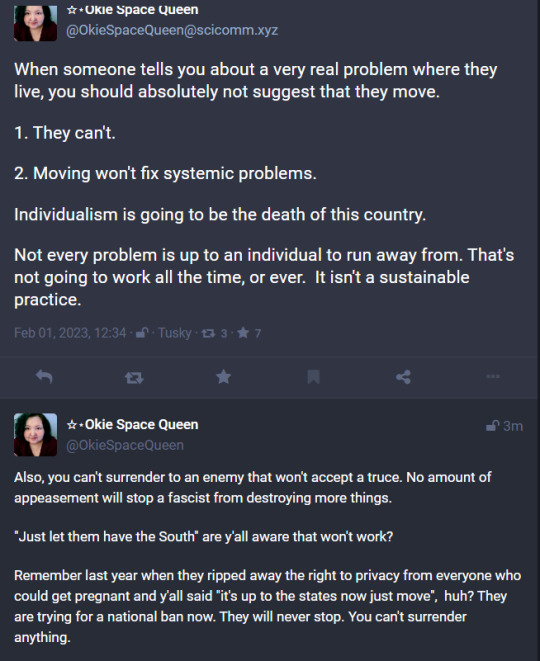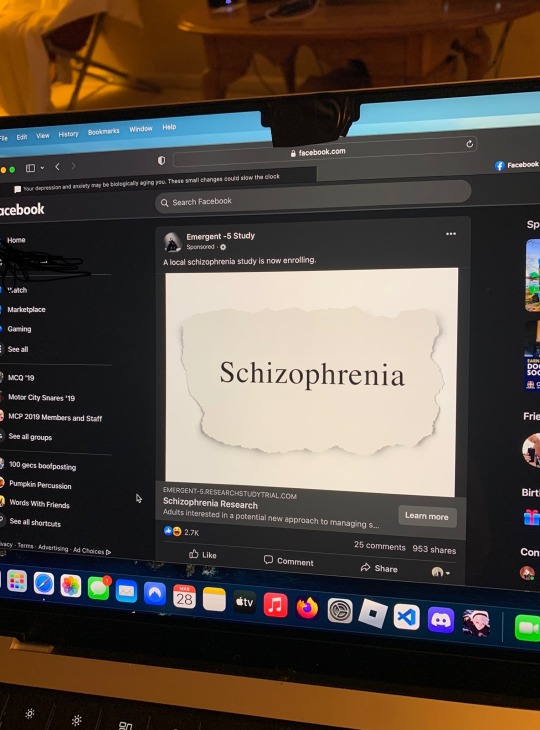#medical privacy
Photo

77K notes
·
View notes
Text
Privacy first

The internet is embroiled in a vicious polycrisis: child safety, surveillance, discrimination, disinformation, polarization, monopoly, journalism collapse – not only have we failed to agree on what to do about these, there's not even a consensus that all of these are problems.
But in a new whitepaper, my EFF colleagues Corynne McSherry, Mario Trujillo, Cindy Cohn and Thorin Klosowski advance an exciting proposal that slices cleanly through this Gordian knot, which they call "Privacy First":
https://www.eff.org/wp/privacy-first-better-way-address-online-harms
Here's the "Privacy First" pitch: whatever is going on with all of the problems of the internet, all of these problems are made worse by commercial surveillance.
Worried your kid is being made miserable through targeted ads? No surveillance, no targeting.
Worried your uncle was turned into a Qanon by targeted disinformation? No surveillance, no targeting. Worried that racialized people are being targeted for discriminatory hiring or lending by algorithms? No surveillance, no targeting.
Worried that nation-state actors are exploiting surveillance data to attack elections, politicians, or civil servants? No surveillance, no surveillance data.
Worried that AI is being trained on your personal data? No surveillance, no training data.
Worried that the news is being killed by monopolists who exploit the advantage conferred by surveillance ads to cream 51% off every ad-dollar? No surveillance, no surveillance ads.
Worried that social media giants maintain their monopolies by filling up commercial moats with surveillance data? No surveillance, no surveillance moat.
The fact that commercial surveillance hurts so many groups of people in so many ways is terrible, of course, but it's also an amazing opportunity. Thus far, the individual constituencies for, say, saving the news or protecting kids have not been sufficient to change the way these big platforms work. But when you add up all the groups whose most urgent cause would be significantly improved by comprehensive federal privacy law, vigorously enforced, you get an unstoppable coalition.
America is decades behind on privacy. The last really big, broadly applicable privacy law we passed was a law banning video-store clerks from leaking your porn-rental habits to the press (Congress was worried about their own rental histories after a Supreme Court nominee's movie habits were published in the Washington City Paper):
https://en.wikipedia.org/wiki/Video_Privacy_Protection_Act
In the decades since, we've gotten laws that poke around the edges of privacy, like HIPAA (for health) and COPPA (data on under-13s). Both laws are riddled with loopholes and neither is vigorously enforced:
https://pluralistic.net/2023/04/09/how-to-make-a-child-safe-tiktok/
Privacy First starts with the idea of passing a fit-for-purpose, 21st century privacy law with real enforcement teeth (a private right of action, which lets contingency lawyers sue on your behalf for a share of the winnings):
https://www.eff.org/deeplinks/2022/07/americans-deserve-more-current-american-data-privacy-protection-act
Here's what should be in that law:
A ban on surveillance advertising:
https://www.eff.org/deeplinks/2022/03/ban-online-behavioral-advertising
Data minimization: a prohibition on collecting or processing your data beyond what is strictly necessary to deliver the service you're seeking.
Strong opt-in: None of the consent theater click-throughs we suffer through today. If you don't give informed, voluntary, specific opt-in consent, the service can't collect your data. Ignoring a cookie click-through is not consent, so you can just bypass popups and know you won't be spied on.
No preemption. The commercial surveillance industry hates strong state privacy laws like the Illinois biometrics law, and they are hoping that a federal law will pre-empt all those state laws. Federal privacy law should be the floor on privacy nationwide – not the ceiling:
https://www.eff.org/deeplinks/2022/07/federal-preemption-state-privacy-law-hurts-everyone
No arbitration. Your right to sue for violations of your privacy shouldn't be waivable in a clickthrough agreement:
https://www.eff.org/deeplinks/2022/04/stop-forced-arbitration-data-privacy-legislation
No "pay for privacy." Privacy is not a luxury good. Everyone deserves privacy, and the people who can least afford to buy private alternatives are most vulnerable to privacy abuses:
https://www.eff.org/deeplinks/2020/10/why-getting-paid-your-data-bad-deal
No tricks. Getting "consent" with confusing UIs and tiny fine print doesn't count:
https://www.eff.org/deeplinks/2019/02/designing-welcome-mats-invite-user-privacy-0
A Privacy First approach doesn't merely help all the people harmed by surveillance, it also prevents the collateral damage that today's leading proposals create. For example, laws requiring services to force their users to prove their age ("to protect the kids") are a privacy nightmare. They're also unconstitutional and keep getting struck down.
A better way to improve the kid safety of the internet is to ban surveillance. A surveillance ban doesn't have the foreseeable abuses of a law like KOSA (the Kids Online Safety Act), like bans on information about trans healthcare, medication abortions, or banned books:
https://www.eff.org/deeplinks/2023/05/kids-online-safety-act-still-huge-danger-our-rights-online
When it comes to the news, banning surveillance advertising would pave the way for a shift to contextual ads (ads based on what you're looking at, not who you are). That switch would change the balance of power between news organizations and tech platforms – no media company will ever know as much about their readers as Google or Facebook do, but no tech company will ever know as much about a news outlet's content as the publisher does:
https://www.eff.org/deeplinks/2023/05/save-news-we-must-ban-surveillance-advertising
This is a much better approach than the profit-sharing arrangements that are being trialed in Australia, Canada and France (these are sometimes called "News Bargaining Codes" or "Link Taxes"). Funding the news by guaranteeing it a share of Big Tech's profits makes the news into partisans for that profit – not the Big Tech watchdogs we need them to be. When Torstar, Canada's largest news publisher, struck a profit-sharing deal with Google, they killed their longrunning, excellent investigative "Defanging Big Tech" series.
A privacy law would also protect access to healthcare, especially in the post-Roe era, when Big Tech surveillance data is being used to target people who visit abortion clinics or secure medication abortions. It would end the practice of employers forcing workers to wear health-monitoring gadget. This is characterized as a "voluntary" way to get a "discount" on health insurance – but in practice, it's a way of punishing workers who refuse to let their bosses know about their sleep, fertility, and movements.
A privacy law would protect marginalized people from all kinds of digital discrimination, from unfair hiring to unfair lending to unfair renting. The commercial surveillance industry shovels endless quantities of our personal information into the furnaces that fuel these practices. A privacy law shuts off the fuel supply:
https://www.eff.org/deeplinks/2023/04/digital-privacy-legislation-civil-rights-legislation
There are plenty of ways that AI will make our lives worse, but copyright won't fix it. For issues of labor exploitation (especially by creative workers), the answer lies in labor law:
https://pluralistic.net/2023/10/01/how-the-writers-guild-sunk-ais-ship/
And for many of AI's other harms, a muscular privacy law would starve AI of some of its most potentially toxic training data:
https://www.businessinsider.com/tech-updated-terms-to-use-customer-data-to-train-ai-2023-9
Meanwhile, if you're worried about foreign governments targeting Americans – officials, military, or just plain folks – a privacy law would cut off one of their most prolific and damaging source of information. All those lawmakers trying to ban Tiktok because it's a surveillance tool? What about banning surveillance, instead?
Monopolies and surveillance go together like peanut butter and chocolate. Some of the biggest tech empires were built on mountains of nonconsensually harvested private data – and they use that data to defend their monopolies. Legal privacy guarantees are a necessary precursor to data portability and interoperability:
https://www.eff.org/wp/interoperability-and-privacy
Once we are guaranteed a right to privacy, lawmakers and regulators can order tech giants to tear down their walled gardens, rather than relying on tech companies to (selectively) defend our privacy:
https://pluralistic.net/2022/11/14/luxury-surveillance/#liar-liar
The point here isn't that privacy fixes all the internet's woes. The policy is "privacy first," not "just privacy." When it comes to making a new, good internet, there's plenty of room for labor law, civil rights legislation, antitrust, and other legal regimes. But privacy has the biggest constituency, gets us the most bang for the buck, and has the fewest harmful side-effects. It's a policy we can all agree on, even if we don't agree on much else. It's a coalition in potentia that would be unstoppable in reality. Privacy first! Then – everything else!

If you'd like an essay-formatted version of this post to read or share, here's a link to it on pluralistic.net, my surveillance-free, ad-free, tracker-free blog:
https://pluralistic.net/2023/12/06/privacy-first/#but-not-just-privacy

Image:
Cryteria (modified)
https://commons.wikimedia.org/wiki/File:HAL9000.svg
CC BY 3.0
https://creativecommons.org/licenses/by/3.0/deed.en
#pluralistic#privacy first#eff#privacy#surveillance#surveillance advertising#cold war 2.0#tiktok#saving the news from big tech#competition#interoperability#interop#online harms#ai#digital discrimination#discrimination#health care#hippa#medical privacy
436 notes
·
View notes
Text
Who’s next?
123 notes
·
View notes
Text
The problem with most identity verification systems is that they're designed to prevent financial fraud by strangers, rather than privacy violations (and resulting interference/abuse) by family members, partners, and acquaintances.
You let me pick up my prescriptions by giving my name and phone number? Do you think my abusive husband doesn't know my phone number?
You let me verify my bank account with my name and birthdate? Do you think my controlling parents don't know my birthdate?
You confirm my doctor's appointment with my name and address? Do you think my meddling daughter doesn't know my address?
Other people have written about the sexism inherent in "mother's maiden name" as a verification question (the assumption that everyone's mother is married, that every married woman changes her name, that every child has their father's and not their mother's surname), but the bigger problem is: Do you think my abusive mother doesn't know her own name?
This is why I like photo ID requirements -- my response to "Not everyone has or can afford photo ID" is "Then fix THAT, and make state ID unrelated to driving." We should all demand universal, free state ID cards. In the meantime, of course, we should support policies that offer alternative ID options for things like voting and healthcare -- but we should not compromise on mandatory individuation.
Before my father passed away, his motor disabilities left him with limited abilities to write or type or speak, so he signed over power of attorney to me (which wouldn't have been necessary if he'd had access to universal design forms of communication, but that's another day's topic). I was horrified to discover that he needn't have bothered, because no one (with one exception) ever asked for the power of attorney paperwork. I signed documents for him, took money from his bank account, and consented to surgery on his behalf, and through all of it, no one ever asked for evidence that I was acting with his consent.
I was horrified by how easy it was. No one questioned me. They assumed that as his daughter and caregiver, I had a right to control him.
Most people, by default, are ableist, ageist, and sexist. Most people, by default, assume that people have a right to make decisions on behalf of their family members, especially if those family members are disabled. Most receptionists, doctors, nurses, bankers, and other professionals will, without a second thought, share information about a client to the client's family member, especially if the client is disabled. It doesn't occur to them to question it. Of course you can tell a wife's information to her husband -- he's her husband. Of course a woman can make an appointment for her disabled elderly father -- she's his daughter. Of course a mother can ask if her 23-year-old disabled son has picked up his medication -- she's his mother. If the decision is left to the individual professionals, most of them will, unquestioningly, defer to their own ableist, ageist, sexist biases.
Individuation has to be enforced. Intra-family privacy has to be enforced. And identity verification requirements that don't protect against family members don't do that.
55 notes
·
View notes
Text


By Simmone Shah
29 February 2024
While Catherine Middleton has been absent from royal duties for two months due to a “planned abdominal surgery,” the British public has been full of speculation about what's going on with their future Queen Consort.
But the royal family has always held a fine line between balancing private health matters with disclosure to the public they serve.
“You could argue that details about a head of state are in the public interest,” says Richard Fitzwilliams, an expert on the royal family.
“But on the other hand, to what extent does a public figure have a right to privacy?”
Catherine's absence fits into a long and evolving history of how royals have chosen to handle health issues.
Past generations often shrouded them in secrecy. Perhaps most famously, in the 1950s, the British public was not told when King George VI had lung cancer.
In 1951, he had his left lung removed because of what was vaguely described as “structural abnormalities," and cancer was not mentioned in his death announcement.
Occasionally, past generations would be more open about less significant problems.
Once in 1982, when Queen Elizabeth, the Queen Mother, had to visit the hospital after nearly choking to death on a fishbone, she issued a statement to the press, joking, “It was only the salmon getting its own back."

“The fishbone is quite revealing because they tended to be more open about minor instances,” says Gareth Russell, a historian and author who focuses on the British royal family.
“Britain was a much more reserved society in the 20th century, and in families across the land and across the social spectrum, cancer or fatal illnesses often weren't discussed.”
Catherine and William’s approach has proved to be starkly different, as they’ve addressed private matters with far more candor.
“Catherine and William are members of a different generation, so they feel no shame in being open about challenges,” says Clare McHugh, a royal historian and author.
Neither Catherine or William have shied away in the past from speaking out about health matters.
Prince William has spoken extensively about the importance of mental health, and Catherine spoke about the difficult morning sickness she faced during her pregnancies.
She also revealed her postpartum baby bump in photos hours after giving birth to her son, Prince George.
In part, it’s a necessary tactic for the internet age in which secrets are much harder to keep.
“I think they do recognize that in order to survive and flourish in a modern era they need to be honest about what is going on with them,” says McHugh.
“It’s better for them to be candid up front rather than let internet rumors fly.”
That they have previously been somewhat transparent only makes their current silence stand out, experts say.
“That’s why William and Catherine’s reticence about what's going on with them is odd,” says McHugh.

As Kathryn Lamontagne, a lecturer in Social Science at Boston University says, sometimes saying nothing causes more of a stir than addressing the problem head on, a lesson the Royal Family learned when Queen Elizabeth II missed parts of a major event in the months before her death.
“For Royal followers, her absence from the Platinum Jubilee celebrations in 2022 was a glaring sign of how unwell she was and a clear indicator of a serious issue on the horizon,” Lamontagne said in an email.
Still, despite her candor in the past, in many ways the Duchess of Cambridge’s silence is simply following tradition.
“This dance between private and public information nudges the line of medical privacy and a public clamoring for details, but it still follows the pattern of giving very few medical details of a certain kind to the public,” says Lamontagne.
“‘Never complain, never explain,’ in the words of the late Queen.”

#Princess of Wales#Catherine Princess of Wales#Catherine Middleton#Kate Middleton#British Royal Family#health issues#abdominal surgery#right to privacy#King George VI#Queen Elizabeth the Queen Mother#Prince William#Prince of Wales#Queen Elizabeth II#medical privacy
23 notes
·
View notes
Text
Controversial opinion: women's rights ARE trans rights and trans rights are women's rights.
Trans rights are human rights. Trans rights are medical autonomy rights and rights to privacy.
Anyone who is against trans rights is a moron who doesn't realize that hurting trans people just hurts women and many, many others in the process.
You want to just hate trans people and make them suffer, but you will make many more suffer.
And if you don't mind that, then yes. You're a fucking problem and a piece of shit.
And frankly, I think you're miserable and lonely and pathetic too.
72 notes
·
View notes
Text
From @MaskTogetherAmerica (bolding mine):
"IN-N-OUT’s customer service line confirmed that masks are banned for workers in AZ, CO, TX, NV & UT, unless they have a doctor’s note. Meanwhile, if you work for @innout in CA or OR, it’s up to you but you must wear only company-provided N95s if you choose to #MaskUp! (Different masks may be allowed with a valid medical note.)
“N95 masks provide the highest level of protection for C0VID-19 and other viruses and are recommended by OSHA for other respiratory protection.” – the policy stated.
@Forbes contributor Dr. Judy Stone shared valuable details in her story: In-N-Out Burger’s New Masking Policy Threatens Their Employees’ Health.
Puzzling, isn’t it? 🧐
See CA & OR Mask Policy:
https://bit.ly/3Q2LfNJ
Call 1-800-786-1000 to let IN-N-OUT know how you feel about their 😷policy.
Key points from Dr. Stone’s article: https://bit.ly/3XUR5CB
👉60% of people in the U.S. have underlying conditions that put them at increased risk for severe C19.
👉Forcing employees to disclose reasons for mask exemption likely violates medical privacy.
👉It’s unfair to ask employees to get a doctor’s note which would require seeing a doctor.
👉Requiring proof of a disability might be considered a violation of the ADA.
👉“Fast food workers don’t owe anyone their smiles.” —@jessica.wildfire.writer wrote in her commentary. Fast food workers certainly don’t owe anyone their lives, considering the risk of getting #LongCovid.
👉The CA OSHA regulations state, “No employer shall prevent any employees from wearing a face covering, including a respirator, unless it would create a safety hazard.”
👉The CDC states, “People may choose to mask at any time. Layered prevention strategies — like staying up to date on vaccines and wearing masks — can help prevent severe illness and reduce the potential for strain on the healthcare system. Wear a mask with the best fit, protection, and comfort for you.”
👉HHS tweeted, “The more often you get C19, the higher your risk of complications.”
👉Masking protects you from respiratory viruses as well as pollutants & pollen."
PLEASE CALL THE CUSTOMER HOTLINE (1-800-786-1000) AND MAKE YOUR VOICE HEARD THAT YOU DO NOT SUPPORT THIS POLICY AND WILL NOT PATRONIZE IN-N-OUT BURGER AS LONG AS THEY DO THIS. You don't need to be rude and keep in mind the customer service rep isn't the one responsible for putting this policy in place.
ANTI-MASKERS, VIRUS-DENIERS, AND OTHER PLAGUE-RATS DO NOT INTERACT WITH THIS POST.
#masks#face masks#workers' rights#employee safety#in-N-out burger#wildfire smoke#covid-19#coronavirus#workplace safety#employee rights#mlop#medical privacy#workers' rights violations
29 notes
·
View notes
Text
The DeSantis style anti-LGTBQ in education legislation has made it to the federal level and New York LGBTQ+ organizations are rightfully pissed at politicians who are even attempting to support this.
One of them had a very public meeting with Congressman Lawler (NY-17) for being the massive hypocrite he is.
I want to have some faith in the Democrats in the Senate, many who are up for re-election in 2024 and 2026, to block this garbage of a bill.
Contact your US Congressperson and tell them not to support HR 5/Parents Bill of Rights Act. This act is literally terrifying.
48 notes
·
View notes
Text

"Freedom" By Chris Vector
203 notes
·
View notes
Text
4 notes
·
View notes
Text
Do these people not understand the reasoning behind roe v wade?
It doesn't matter that abortions themselves were never mentioned in the constitution (hell, neither was judicial review but here we are). What matters is that the 4th amendment protects our right to privacy. They said that the government shouldn't be able to ban abortions wholeheartedly because it is a medical decision made between a pregnant person and their doctor and the government doesn't need to be a part of that decision.
#roe vs. wade#supreme court#abortion mention#abortion rights#medical privacy#4th amendment#us politics
95 notes
·
View notes
Photo

stop telling people to ‘just move’
#toot#toots#mastodon#human rights#systemic oppression#southern united states#United States#inequality#right to privacy#internet privacy#online privacy#medical privacy#privacy#LGBTQ#reproductive justice#reproductive freedom#reproductive rights#reproductive choice#reproductive health
11K notes
·
View notes
Text
Everyone is saying to delete your period tracking apps — yes, but :
🔥 WAIT! 🔥
Before you delete, change every single bit of information in it!
Track bleeding EVERY DAY.
Change your height, weight, name, location, EVERYTHING.
Then save it so that’s the info that gets backed up.
55 notes
·
View notes
Text
https://www.instagram.com/reel/Cf1joZwLedG/?igshid=YmMyMTA2M2Y=
This isn’t showing up as a video, but this is an IG reel of a nurse explaining how you can stop people you don’t want visiting your from knowing if you are in the hospital. It’s meant to protect DV victims but you can use this system for any reason.
18 notes
·
View notes
Text

I love HIPAA or HIPPA or whatever antiquated pretense of medical privacy we have in America. Almost as much as I love Facebook.
This is why I have stopped using FB. Not even a thin veneer of data privacy, pure unfiltered capitalism.
3 notes
·
View notes
Text
New Mexico and Colorado. You are my only hope if I ever get raped and become pregnant. You are my only hope if I ever have an unwanted pregnancy. You are my only hope if I ever need to terminate because there’s something wrong. Of course, my only hope of having an abortion safely. And you are both bewtween 700-1,000 miles away from me. This is inhumane. Many will die.
#abortion#roe v wade#dobbs v. jackson women’s health organization#womens rights#womens health#gay rights#pride#obergefell v. hodges#griswold v. connecticut#medical privacy#you should all be scared#open door to HELL
10 notes
·
View notes